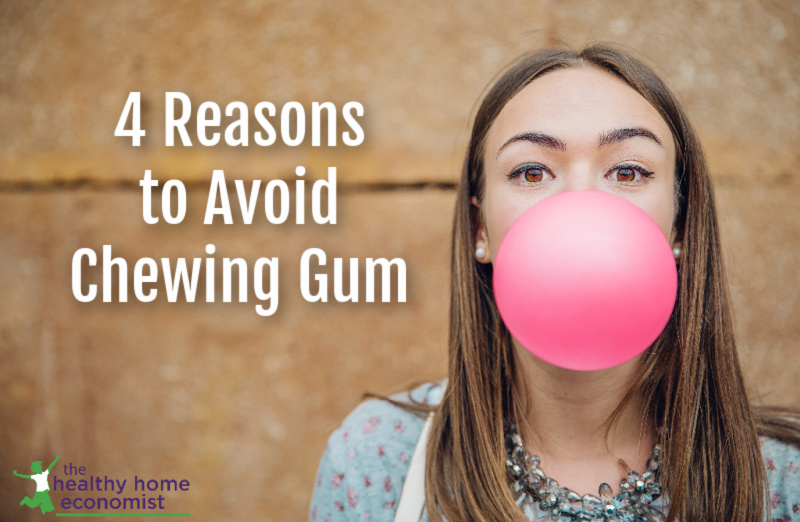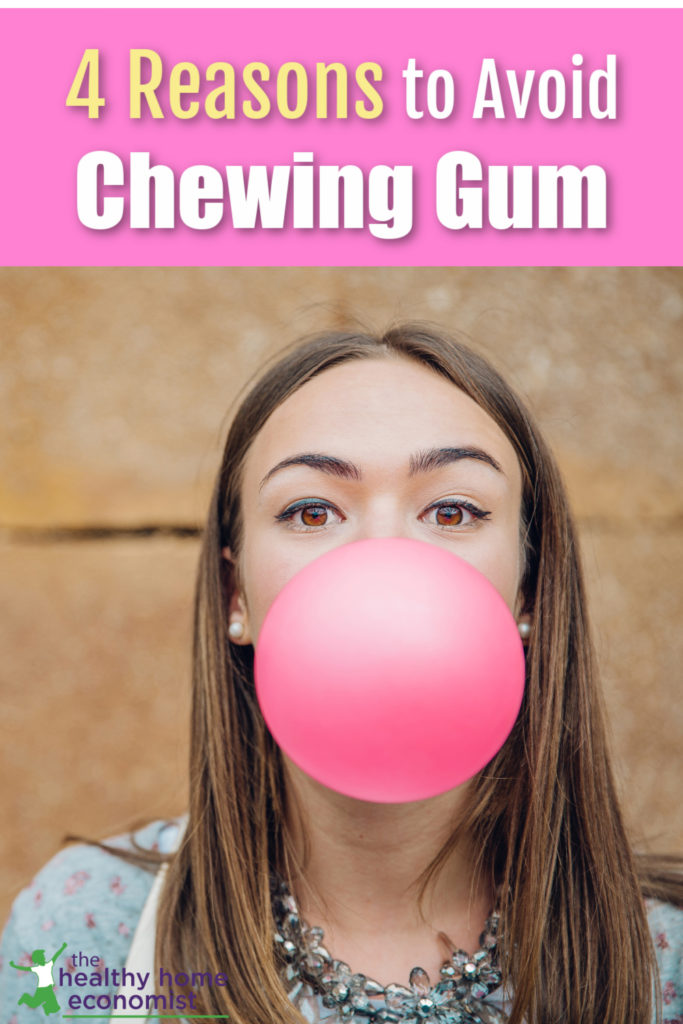The dangers of chewing gum frequently or for more than a few minutes at a time and why it can contribute to the development of digestive disorders and mercury toxicity among other problems. This habit can be particularly problematic during pregnancy.

Chewing gum is a popular activity for people of all ages. I remember becoming quite proficient at blowing very large bubbles at summer camp one year. From then on, chewing bubble gum became a favorite childhood pastime of mine. Besides the bubble blowing, I got pretty good at peeling the gum off my face too!
While chewing gum may be fun and a good way to kill time or stave off boredom, is it a healthy activity? It seems like some folks chew gum every single day. Are there any health issues to be aware of from too much chewing?
Chewing Gum is Full of Chemicals and Artificial Sweeteners
Probably the number one reason to avoid most chewing gums is that they are loaded with chemicals, additives and synthetic ingredients.
GMO corn syrup, artificial colors and flavors, aspartame, sucralose, or other unhealthy sweeteners like xylitol (and the list goes on) are enough to cause any label reading parent to steer clear of these seemingly harmless treats.
It is surprising how some caregivers who would never dream of giving a child a diet soda don’t think twice about doling out sugarless gum with similar potential for neurotoxicity.
Healthfood stores do offer some decent alternatives, but in my experience kids don’t seem much interested in them.
They want the brands their friends chew that come in the the brightly colored packaging and have everlasting synthetic flavors that don’t diminish even after many minutes of chewing.
To keep things simple, I’ve made the habit of simply not buying gum at all. If I really need to chew something on occasion, I keep this healthy gum alternative in the pantry.
My kids do occasionally get a wad of gum at parties and whatnot. We don’t live in a bubble, so this is going to happen occasionally. But, this is an exception rather than the rule. I do try to make sure they don’t chew it for long though!
Uses Up Valuable Digestive Enzymes
It is not well known that the amount of digestive enzymes your body can produce in a given lifetime is relatively finite. Chewing stimulates the secretion of digestive enzymes to prepare for food that never arrives in the stomach.
Doesn’t it seem like a waste to use up your precious digestive enzyme reserve of these valuable, live proteins on such a useless activity?
If you chew gum frequently between meals, it is very feasible that you are using up your digestive enzyme reserves so that the next time you eat, you won’t have enough digestive enzymes on hand to fully digest the meal.
It is conceivable then, that frequent gum chewing gum can provide the perfect backdrop for the development of digestive disorders.
And, if you already suffer from digestive complaints, gum chewing should definitely be avoided!
Contributes to the Development of TMJ and Other Jaw Problems
Oral surgeons at UT Southwestern Medical Center in Dallas contend that too much gum chewing causes jaw stress.
Dr. Sinn, a UT Southwestern oral surgeon, warns that jaw soreness, jaw “clicking” or pain in the jaw, head, or neck can be signs of TMJ syndrome and that gum chewing should be discontinued should such symptoms emerge.
Given that gum chewing is commonly used to relieve stress, Dr. Sinn suggests other methods for reducing tension such as squeezing a ball, relaxation techniques or regular exercise to avoid the risk of chronic jaw problems.
Gum Releases Mercury from Amalgam Fillings
Probably the most important reason to abstain from chewing gum is that it releases mercury from dental amalgam fillings.
A Swedish study found that people with silver fillings who chew gum for 5 hours or more each day had significantly higher levels of mercury in their blood and urine than those people with silver fillings who chewed gum infrequently.
Mercury levels in the blood, urine, and breath at exhalation increased in proportion to the number of silver fillings each study participant had.
Given that mercury is neurotoxic in any amounts in the body, it seems that chewing gum with silver fillings is best avoided. This is the case even if a person has only one silver filling.
Skip the Gum if Pregnant
For pregnant women with silver fillings, chewing gum can prove toxic to the fetus should any mercury whatsoever be released into the bloodstream.
Many pregnant women chew gum to help relieve heartburn or indigestion. Yet, the dangers of this activity if one has dental amalgams are not readily provided at prenatal visits even though mercury easily crosses the placenta.
And no, removing silver fillings while pregnant is not the solution either as it can do more harm than good. Just don’t chew gum during this time!
Can Chewing Gum Ever Be Helpful?
I remember after one particular dental visit years ago, my jaw became painfully sore.
The dentist had obviously overextended the jaw joint and the inflammation and pain was really excruciating for days on end. I tried to not talk much and eat only soft liquid foods to no avail. The joint just didn’t seem to get any better.
Finally, I decided I would try to strengthen my jaw by chewing gum for brief periods of time. This was an attempt to slowly rehabilitate it. An oral form of physical therapy, if you will.
After about a week of chewing gum for short intervals each day, my joint pain began to dissipate. Another week, and it disappeared completely. After that, I stopped chewing gum and the pain still did not return.
Chewing gum might also be helpful after meals when additional enzymes are needed for digestion. Chewing gum for a few minutes after eating does seem to help some folks avoid indigestion, heartburn, or reflux.
In some circumstances such as these, chewing gum can be therapeutic. In most cases, though, it should be avoided as an activity that really is not very health promoting.

References
(1) Chewing Gum Releases Mercury into Blood and Urine
(2) Health Watch – Gum Chewing







I’m not a gum-chewer, but sometimes I enjoy chewing on a piece of honeycomb from the honey jar.
My dentist also recommended xylitol gum after meals because both the xylitol and the increase in saliva helps to fight off the germs that cause cavities.
The Sticky Truth About Chewing Gum – The Healthy Home Economist http://t.co/h8p1iD5
The healthfood stores have some decent brands without additives. My favorite is bubble gum though and all of those that I’ve seen are pretty gross ingredients wise.
http://www.gleegum.com/ I haven’t tried these yet but hope to soon!
haven’t read yet but noting what got me to quit finally: I have sharp canines, and inevitable when I chewed gum, I bit my lip. it’s amazing I didn’t wind up with a piercing for all the times it happened.
I wish I could get my husband to give up gum. :/
Is there a good “healthy” gum I could at least get for him to try?
not sure how Sarah feels about this, but I tried Steviadent & liked it. I got it from vitacost.com (also a good place to find other discounted supplements & personal care items- not affiliated).
We use Spry gum on occasion made with xylitol you can also order through vitacost. Don’t know if it’s the best alternative or not? But as far as flavor go we think it’s great
ditto
aspartame 🙁
I love these posts because they help me become more aware of even the little things, which can over time have big consequences. Thank you Sarah and please keep teaching us!!